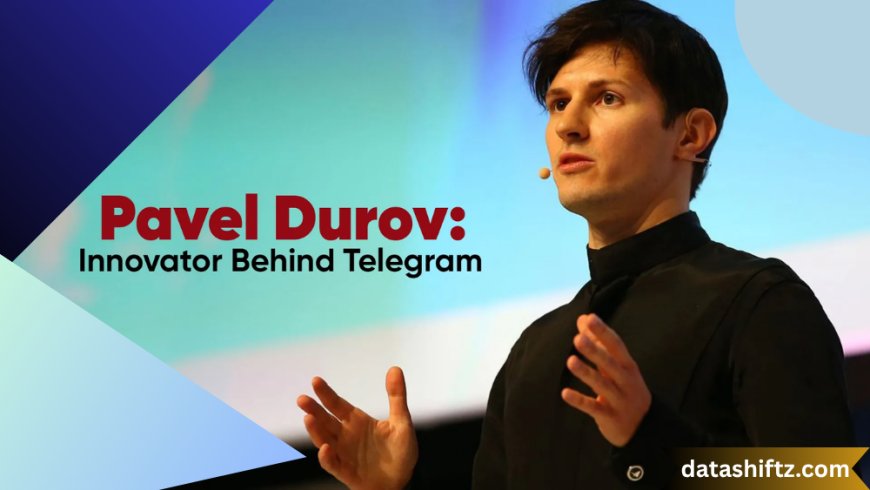Pavel Durov: The Visionary Behind Telegram and the Future of Digital Privacy

Introduction
In a digital age dominated by concerns over data security, censorship, and monopolistic control, one name stands out as a fierce defender of online freedom: Pavel Durov. Often referred to as the "Mark Zuckerberg of Russia," Durov is best known as the founder of Telegram, a cloud-based instant messaging app with over 900 million users worldwide. But beyond his technological achievements, Durov has become a symbol of digital resistance, privacy rights, and innovation without borders.
This article delves deep into the life, vision, and impact of Pavel Durov—from his early ventures in Russia to his current role as a global tech influencer. It also explores the controversies, philosophies, and future aspirations of one of the most enigmatic figures in modern technology.
Early Life and the Rise of VKontakte
Background and Education
Pavel Durov was born on October 10, 1984, in Leningrad (now St. Petersburg), Russia. Coming from an academic family—his father was a professor of philology—Durov excelled in his studies. He graduated from St. Petersburg State University with honours in philology and linguistics.
It was during his university years that Durov began experimenting with coding and web development, setting the stage for his first major project.
VKontakte: The Russian Facebook
In 2006, Durov founded VKontakte (VK), a social media platform that quickly became Russia’s most popular social network. With features resembling Facebook, VK allowed users to share music, videos, and messages—attracting millions of users across the former Soviet Union.
However, VK was more than a business venture. It reflected Durov’s early views on free expression and user autonomy. But those ideals were soon tested.
Political Pressure and Exile
Clash with Russian Authorities
In 2011–2014, Durov came under increasing pressure from the Russian government, particularly during the Euromaidan protests in Ukraine. Authorities demanded that VK hand over user data and block opposition pages—requests Durov famously refused.
In 2014, after a series of boardroom battles and growing interference, Durov was forced to resign from VK and fled Russia. He later declared he had no plans to return, citing the state’s growing encroachment on civil liberties.
Becoming a Digital Nomad
Following his departure, Durov adopted a stateless lifestyle, refusing to align with any government. He reportedly holds St. Kitts and Nevis citizenship and has operated Telegram from various locations including Dubai, London, and Singapore.
Timeline of Key Events in Pavel Durov’s Life
| Year | Event |
|---|---|
| 1984 | Born in Leningrad, Russia |
| 2006 | Founded VKontakte (VK) |
| 2011 | Refused to cooperate with Russian censorship |
| 2014 | Ousted from VK and left Russia |
| 2013 | Launched Telegram with brother Nikolai |
| 2021 | Telegram surpasses 500 million users |
| 2023 | Telegram launches premium subscription tier |
| 2024 | Telegram reaches 900M active users |
A Platform for Privacy and Protest
Telegram was launched in 2013 as a secure, fast, and free messaging app. Developed with the help of his brother Nikolai Durov, a mathematical genius, the app quickly gained a reputation for its encrypted chats, open-source API, and decentralized philosophy.
Telegram’s Defining Features
-
End-to-End Encryption (Secret Chats)
-
Cloud-Based Messages with Unlimited Storage
-
Support for Bots, Channels, and Groups
-
Multi-Device Synchronization
-
Self-Destructing Media and Messages
-
No Ads (until 2023)
-
Commitment to Free Speech
Telegram has been widely adopted in countries facing censorship, including Iran, Russia, Belarus, and Hong Kong. It has become a platform for political activists, journalists, and those seeking alternatives to mainstream social media.
Durov’s Philosophy: Libertarianism Meets Tech
Pavel Durov is famously reclusive and fiercely independent. He champions libertarian principles, advocating for:
-
Digital privacy
-
Freedom of speech
-
Decentralisation
-
Minimal government interference in tech
He believes that centralized control over the internet threatens democracy and innovation. This belief system guides his refusal to comply with authoritarian governments, even at the risk of Telegram being banned.
Controversies and Criticism
Despite its popularity, Durov and Telegram have faced criticism for:
-
Being used by extremist groups (due to its encryption and lack of moderation)
-
Delays in removing harmful content
-
Transparency concerns regarding the app’s funding and monetization
In 2023, Telegram introduced a Premium tier to generate revenue while maintaining its commitment to ad-free messaging for standard users. Critics argued this move contradicted its open-access ethos, but Durov defended it as necessary for long-term sustainability without selling user data.
Comparing Telegram with Other Messaging Apps
| Feature | Telegram | Signal | |
|---|---|---|---|
| Encryption | End-to-end (secret chats) | End-to-end default | End-to-end default |
| Group Size Limit | 200,000+ | 1,024 | 1,000 |
| File Size Limit | 2 GB (free) | 100 MB | 100 MB |
| Cloud Sync | Yes | Limited | Limited |
| Business Integration | Limited | Extensive | Minimal |
| Ads | No (with Premium model) | None | None |
Durov’s Vision for the Future
Pavel Durov has expressed ambitions beyond messaging:
-
Web3 Integration: Exploring blockchain-based technologies for decentralised communication.
-
Digital Identity Protection: Enhancing anonymity and protection in an era of surveillance capitalism.
-
AI and Bot Innovation: Leveraging Telegram’s open API to build intelligent assistants.
-
Global Internet Access: Advocating for global online freedoms and resisting firewalls like China’s Great Firewall.
He also dreams of creating a tech ecosystem free from Big Tech monopolies, pushing toward a future where users—not corporations—control their data.
Conclusion
Pavel Durov is not your typical tech CEO. He’s a visionary outsider, an innovator who defies convention, and a staunch believer in digital freedom. Through VK and Telegram, he has reshaped how millions connect, communicate, and protect their privacy.
In a world increasingly dominated by surveillance, algorithmic control, and censorship, Durov’s work stands as a powerful reminder that technology can—and should—serve the interests of the people. Whether you view him as a rebel, a genius, or a privacy crusader, one thing is certain: Pavel Durov is redefining the boundaries of digital freedom.
“Privacy is not for sale, and human rights should not be compromised out of fear or greed.” – Pavel Durov
Would you like a downloadable PDF of this biography or an infographic timeline of Pavel Durov’s achievements?





























